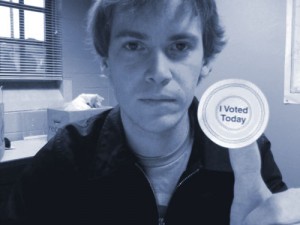Social media sites have become a new venue for political activism
By Julie Mazziotta
Forget politicians encouraging you to vote on social networks, now you can hear it from people you know much better. Your friends.
On Nov. 2, the day of the 2010 mid-term elections, Facebook, Twitter and Foursquare provided applications for users to easily declare to their friends or followers that they voted, according to Computer World Daily.
Facebook placed a large toolbar on the homepages of every user in the United States over 18 with an “I Voted” button. The toolbar showed the total of Facebook users who clicked the button, along with your Facebook “friends” who pledged that they too voted by absentee ballot or at their polling place. The toolbar also linked users to a separate page on Facebook, where they could look up their polling place, and check back later in the day for live coverage of the results with ABC. 
Twitter made #ivoted an official hashtag, a way of tracking popular topics on Twitter, that day, and also added #votereport for Twitterers to report back on their experiences voting, MSNBC reported.
Foursquare, a service that allows users to “check in with their friends and update their location,” according to their website, added a program similar to Facebook’s, with additional information about the person’s gender, the time they voted, and their polling place, according to an article on Tech President.
‘I Voted’ toolbar
Facebook first debuted the “I Voted” toolbar in the 2008 presidential elections, with 5.4 million people clicking “Yes.” This year, that number increased to over 12 million people according to Tech President, although there are now 500 million Facebook users, compared to 100 million in 2008.
Matt Kerbel, a political science professor at Villanova University spoke to students at Bryn Mawr College Nov. 11, on a panel titled, “New Media in the 2010 Election: What the Hell Just Happened Here?” Kerbel doubted the legitimacy of the Facebook toolbar, saying, “The internet give you new ways to talk to your friends, and to convince them to vote,” he said. “Checking a little box on Facebook; there may be a little social bias in play and you want similarly-minded friends to check yes.”
Kerbel continued, saying, “However, if you talk with your friends, text them, chat, and really raise the subject, that will be effective and persuasive, and the new media gives you more opportunities to do that,” he said. “I think it there’s great potential.”
Starting in 2008, politicians could create “fan” pages on Facebook, enabling them to update their “fans” with videos and other news about their campaigns, forever changing the way politicians run their candidacies, according to CNN. The “I Voted” badge on Facebook brings up questions about which is more effective: politician’s “fan” pages or the “democracy guilt trip,” as MSNBC put it, from your Facebook friends.
Philip Dickieson, 19, a sophomore at St. Mary’s College of Maryland, believes that the “I Voted” isn’t effective on Election Day.
Does it work?
“I feel that if you’re seeing that the day of, and you haven’t already planned to vote you’re not going to,” he said. “If you see that on the day of you’re not going to be say, ‘Oh, I’m going to go vote now.'”
Dickieson cited the necessary preparation to vote as a deterrent to college students making a last-minute decision to vote on Election Day.
“People at our age have to plan to vote and know where their polling station is, or they would’ve had to do the absentee ballot,” he said. “[The “I Voted” button] was a good way to see who else voted, but I don’t think it’s an effective way of getting people to vote because you need to plan that in advance and it’s a decision you make on your own. I don’t think it’s really something someone can pressure you into doing the day of.”
Alison Whitney, 19, a sophomore at Bryn Mawr College, disagreed, saying that knowing which of your friends voted could encourage more people to vote. She also explained the lack of political advocates on Facebook for users if they aren’t already “fan” of them.
“I’m not fans of any politicians on Facebook, so because of that I think the “I Voted” bar would be better,” she said.
Alexander Heffner, a sophomore at Harvard University and founder of ScoopDaily.com also spoke on the panel at Bryn Mawr, and found that people thought the toolbar was annoying, but believes the idea was a good start.
“Although I think in theory it would work, in reality I was getting people saying, ‘This thing is plastered on my Facebook page, how do I make it go away?'” he said. “So really there’s an upside and a downside. Maybe in 2012 we’ll have a little bit less annoying way of doing these things.”
While the new methods of reaching out to voters through social media are effective, Duncan Black, a senior fellow at Media Matters for America, said, the best way is still the most basic.
“We know that the best way to get people who are registered to vote is to knock on their doors, call them up,” he said. “That’s what works.”
